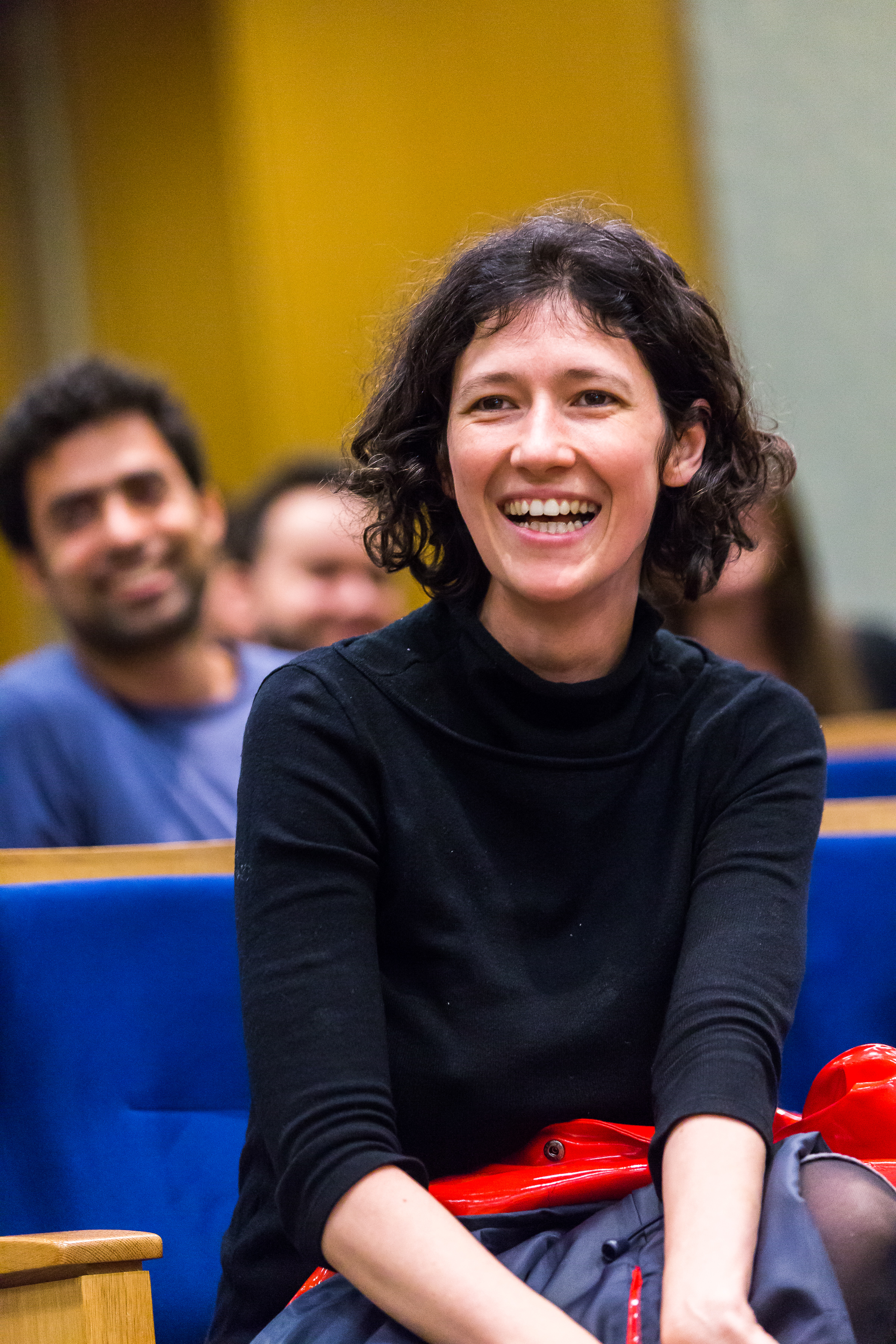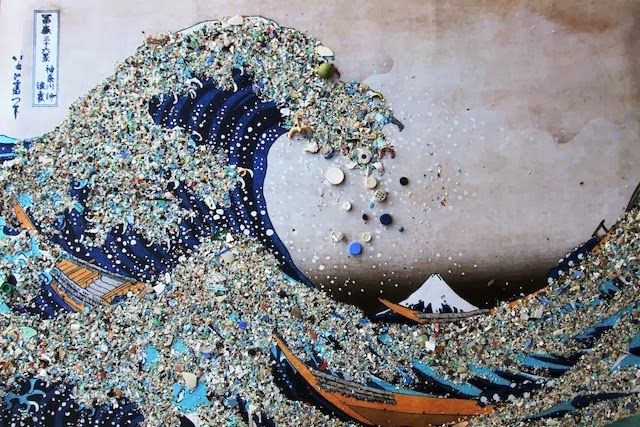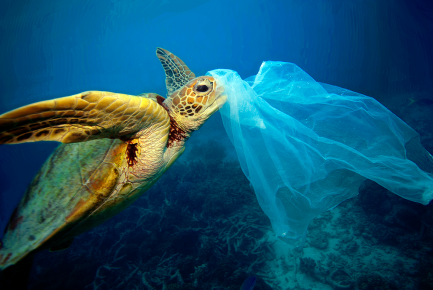Sarah Baker
Ainhoa Perez Garijo
“Hokusai’s Great Wave” by Bonnie Monteleone, 2016
Greenepeace USA, Turtle and Plastic in the Ocean © Troy Mayne / Oceanic Imagery Publications
Nine years ago Ainhoa Perez Garijo took the first steps towards reducing her waste and today she and her family live almost completely waste-free, meaning they do not use any unnecessary plastics and try not to not send anything to a landfill. When Ainhoa first moved to New York City almost ten years ago she became aware of the massive amount of waste that the city produces every day. The waste suddenly became “visible” to her as she realized she “was coming back from shopping with more plastic and packaging than food.” Although her transition to zero-waste was a slow process, she thinks that she could have done it more quickly and hopes that she is at the forefront of a movement that will pave the way for others.
Ainhoa grew up in the large metropolis of Madrid, Spain, and always cared about both animals and nature. Most people that she knows who live zero-waste grew up “close to nature, in the middle of the mountains, or close to the ocean,” but that was not the case for her, and she loves living in big cities and enjoying all that cities have to offer. Being environmentally aware and living in a city do not have to be mutually exclusive.
Ainhoa is currently a post-doctoral associate in Herman Stellar’s lab where she studies the “last will of dying cells,” or how cells undergoing apoptosis communicate with neighboring cells in order to coordinate collective cell death. You may recognize her from her involvement in the Child and Family Center on the Rockefeller University’s campus. A mother of two daughters, she believes that her kids have been extremely helpful in her path to zero-waste. As she says, “It’s really funny to see how my older daughter is aware of plastics and reminds her dad when he forgets to refuse any plastic item.” Ainhoa is also passionate about teaching and is currently part of the Scientist-in-Residence program, a NYC-wide initiative that matches scientists with classrooms in the NYC area to bring scientific research and expertise to high-need schools.
This past year, Ainhoa partnered with Rockefeller’s Science Communication and Media group to launch the Science & Nature documentary series, featuring various documentaries about the environment, each followed by a discussion about how to promote more sustainable practices on campus. Ainhoa wants to inspire the campus using documentaries similar to those that challenged her to change her daily life and become aware of the issues that we as a community have the opportunity to tackle. So far, Ainhoa has shown two documentaries in the year-long series, and this initiative has already brought together many people who have offered some great suggestions about how we can improve sustainability here at Rockefeller. She has plans to meet with the Sustainability Committee to relay these suggestions and to work with the administration on reducing unnecessary waste.
Ainhoa believes that whereas “Rockefeller is such a special place, probably the best institution to do research in the world…with the best scientists, the best campus, the best programs, and the best standards of living…we should become leaders in environmental policies as well, especially considering the current political situation.” As she emphatically exclaims, “If scientists don’t lead this movement, who will?” She hopes to help others in her community start to see waste. Once we realize how much trash we throw away every day and understand that it is mostly unnecessary, she declares that “it’s actually quite liberating.”
Plastic pollution is an environmental issue that largely affects CO2 emissions and conservation of biodiversity. Today, the Rockefeller community should start working with companies that use less packaging and efficiently reuse and recycle materials. Our cafeterias on campus should also be plastic-free, as there are “plenty of zero-waste options.” It is time to change our lifestyles because we are damaging the environment beyond repair. This does not only affect other species and the planet, but also greatly impacts humankind and our children. As Ainhoa pronounces, “We can easily live without plastic, or without fossil fuels, but we cannot live without breathing.”
Ainhoa believes that just as with other movements in the campaign for human rights, it is now time for the environmental movement. Although change may be initially regarded as “crazy, idealistic, or simply impossible to accomplish…once the shift is made, younger generations cannot even believe that things were the way they were in the past. We could call this the Planet Rights Movement. And Rockefeller University could make history and be remembered as a leader in this movement. It’s just the right thing to do.”
As she said passionately during her introduction to the last documentary, “As scientists, shouldn’t we do what science has told us is right and reduce our impact on our environment…People think that I am crazy and ask me how I could go waste-free…and you know what I tell them – it’s actually very easy.” If anyone is interested, she is happy to help them along the way. She wants you to get in touch, and here she has shared some of her tips for beginning your transition to zero-waste today.
Ainhoa’s Tips to More Sustainable Living:
- Study your garbage and try to think of alternatives to what you throw away. One day go to the supermarket and challenge yourself to buy everything plastic-free. It will help you start “seeing” the plastic.
- Refuse single-use plastics, especially the big 4: plastic bags, plastic bottles, plastic cups, and plastic straws. There are reusable alternatives for each of these items that you can carry with you every day.
- Food waste makes most of the trash that is generated in most households. If you live in Faculty House/Scholars Residence, there is compost collection in the basement. Otherwise you can take your food scraps to Green Markets or even have your own composting bin at home. Make sure that you don’t buy food in excess, and make sure you cook it, eat it. or freeze it before it goes bad.
- Take your own containers to stores. This is probably the easiest and most efficient way of reducing your plastic waste. The best places to buy things in bulk are food co-ops. I like very much the 4th St. Co-op and the Bushwick Co-op. You can also find large bulk food sections at Whole Foods and Fairway, buy meats and cheeses at deli counters in supermarkets where they are not pre-wrapped, and buy laundry detergents and soaps at the Package Free Shop in Brooklyn. You can find many more options using the Bulk app.
- Look for plastic-free alternatives or make your own. For example, I buy milk in returnable glass bottles from Trickling Springs Farms, make my own yogurt, ice cream, and toothpaste, and use a compostable toothbrush made of bamboo. For feminine products, switch to the menstrual cup or reusable panty liners, and with kids use reusable cloth diapers. And as a general rule, if there is something you want and can’t find package-free in stores, look for a way of making your own. There are plenty of easy recipes online for everything!
- Get rid of your trash can. Once you manage to greatly reduce your garbage, this is the best way to get as close to zero-waste as possible. Collect your remaining trash in a cup or jar in the kitchen counter, and throw it in a trash can in the street when you need to. This will make you much more aware of everything you dispose of. And it also means you won’t use plastic bags for the garbage!
- Repair, repurpose, or donate. Fix your non-working items, sew your broken clothes, be imaginative and make with them something new, or use something else you already have to replace them. If you want to get rid of something, think of donating instead of throwing it away. For unusable clothes and shoes, a good alternative are the Fabric Recycling points in most of the NYC Green Markets. They’ll use them to make insulating material.
- The single most effective way of not producing waste is not buying! Every time that you want to buy something ask yourself: do I REALLY need this? If you really need to buy, then buy second hand and products made from natural materials and with minimal or no packaging. The best of all: get it in the Faculty House Thrift Shop where it will be almost free and the few dollars you spend will benefit the RU kids. If you want to buy something new, some good options are the Package Free shop or the online store Life Without Plastic. If you want to buy a gift for someone else think of experiences instead of material things such as tickets for a museum, theater, opera, an online gift card for a bakery, restaurant, or spa, a cooking, music, or dancing lesson, etc. The options are innumerable and the gifts are way cooler.
- Recycling should be the last resource, only when you have something that you couldn’t refuse, reduce, or reuse. Even though it’s better than sending something to landfills, it still takes lots of energy and carbon emissions to transport and recycle something (not to mention that collection involves tons of plastic bags). Additionally, plastic recycling is especially problematic and, contrary to glass or aluminum, it is usually “downcycled” into less desirable products that can no longer be recycled. So try to make every effort to avoid plastic, even recyclable ones.



